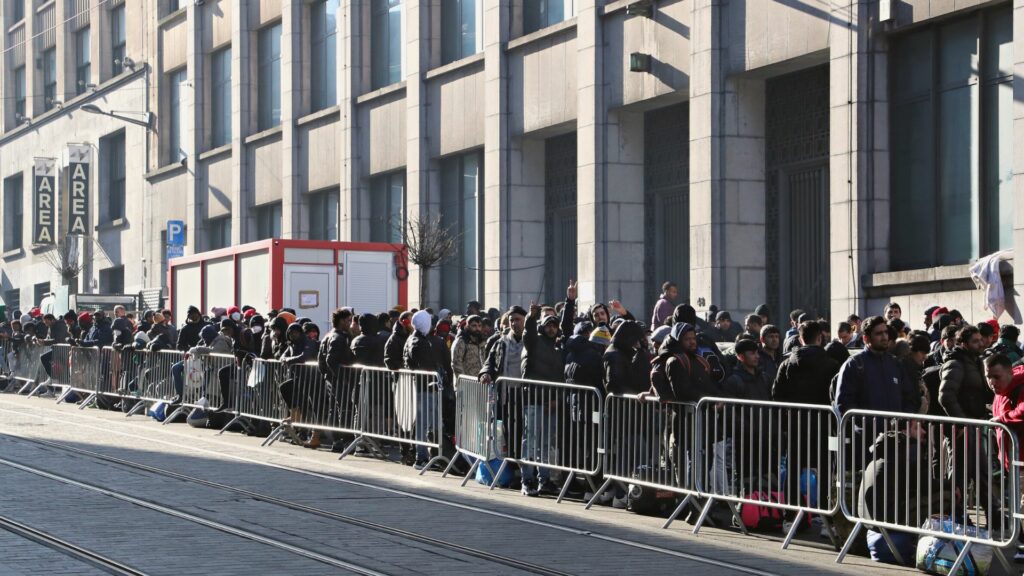The evacuation of the squat in the Rue de Palais in Schaerbeek caused some controversy between Flanders and the Brussels-Capital Region on Wednesday evening as 163 asylum seekers were taken to a hotel in Flanders by Brussels services.
Owing to a lack of space in the emergency shelter, The 163 asylum seekers were finally installed in 60 rooms in an IBIS hotel in the Flemish municipality of Sint-Pieters-Leeuw. The rooms are booked until 28 February. But local authorities complained that they had not been informed.
"Yesterday the owner of this hotel was informed, but as mayor and police zone we knew nothing. This is Kafkaesque; we have to solve a problem, not move it" said mayor Jan Desmeth, who called the course of action "a disgrace."
Flemish Minister for Local Administration Bart Somers reacted furiously on Twitter. "It is unacceptable for [Brussels Minister-President Rudi] Vervoort to house 163 Brussels homeless people in Sint-Pieters-Leeuw without prior consultation with the mayor and the Flemish government. This is not how we deal with local governments, this is not how regions treat each other. Simply disloyal."
His colleague, Flemish Justice Minister Zuhal Demir, asked Federal State Secretary for Asylum and Migration Nicole de Moor to apologise. But de Moor denied any part in the affair, saying that it is the Brussels-Capital Region that organised the emergency reception, and it was their choice to bring people to a hotel.
"I regret that there was no consultation, which is something I always do. Hotel accommodation is not a sustainable solution," she responded on Twitter.
In the meantime, the hotel guests were already given a medical screening. Vluchtelingenwerk Vlaanderen, an organisation dedicated to refugees, says they should enter regular reception as soon as possible. "Especially for that medical guidance. But also for practical matters, such as knowing where to take the bus."
Hygiene and security
A press release from Vervoort's office stated that the purpose of the operation in the Schaerbeek squat was "to evacuate the building as the hygiene and security situation inside was getting worse, "which posed great risks to the occupants."
Measures had been taken by the Federal Government, the Brussels-Capital Region and the municipality of Schaerbeek to accommodate everyone identified as occupants of the evacuated building on Rue du Palais before the start of the operation.
The governments worked together with the Common Community Commission (GGC), safe.brussels, the police zones and medical and social service providers to do so. On Tuesday, 250 people staying in the building were given shelter at the Crossing Schaerbeek site, where they received health assistance and were medically screened.
"However, some people who identified as occupants could not be accommodated on Tuesday and therefore remained for the night in the building on the Rue de Palais," the authorities said. "They were then given shelter on Wednesday before the police proceeded to empty and lock the building."
Related News
- Evacuation of Schaerbeek squat: Buses take residents to new shelters
- 'Shameful fiasco': Evacuation of Schaerbeek squat denounced
- Person found dead in Schaerbeek squat in Brussels
The medical screening revealed three cases of tuberculosis, one case (and a probable case) of pulmonary diphtheria, and seven cases of skin diphtheria. Those affected were all transferred to the Saint-Pierre hospital in Brussels. Additionally, 46 cases of scabies were also identified and treated.
"Those who were not part of the building's occupants were not offered shelter. The operation only targeted the building on Rue de Palais and the people staying there," the authorities said.
Médecins du Monde lors de l'évacuation des demandeurs d'asile à la #ruedesPalais : « L’évacuation peut être résumée en deux mots: chaotique et inadéquate. Des personnes se retrouvent depuis ce matin dans la rue des Palais sans être aidées. #CriseDeLAsile#JusticeMigratoire pic.twitter.com/8VegpsAMav
— Médecins du Monde (@MdMBelgique) February 14, 2023
At 16:00 on Wednesday, more than 200 police officers moved to evacuate the building: "The building could be evacuated and the police officers conducted an inspection tour to make sure no one was still inside. That inspection revealed 25 people still in the building. They were asked to leave. The operation was over at 18:00."
In total, nearly 1,000 people have been given the shelter that is the legal obligation of Fedasil and Samusocial at the end of January. "The building has now been emptied and locked until the Capital Region can restart work to transform it into a dedicated shelter for vulnerable people."

